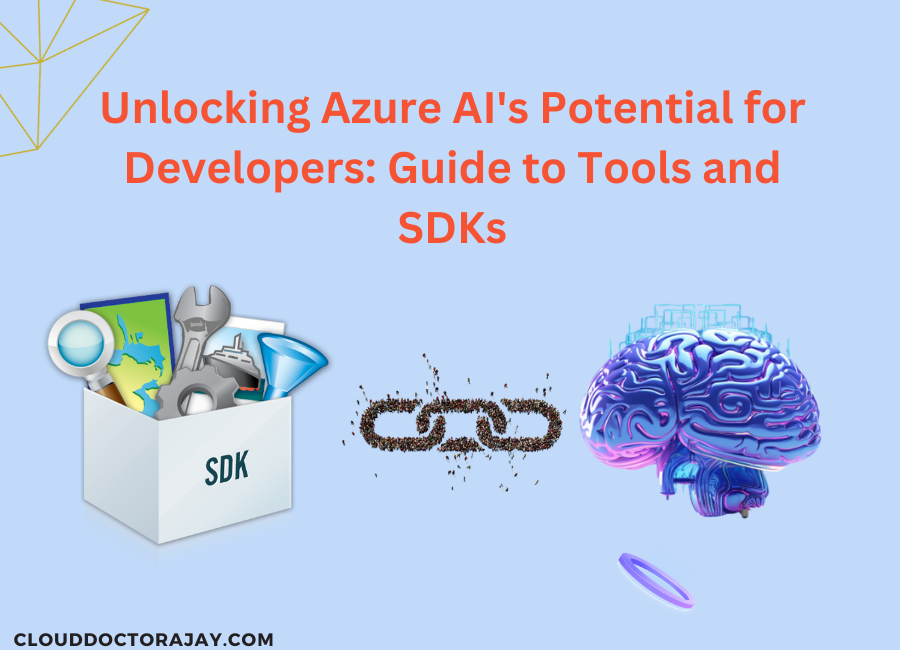Within the quickly changing field of artificial intelligence (AI), developers are always looking for reliable platforms that enable them to create intelligent solutions with ease. A leader in offering a range of AI tools and software development kits (SDKs) that let programmers take advantage of AI’s full potential is cloud computing provider Microsoft Azure. We’ll dive into the realm of Azure AI in this blog, looking at the SDKs and tools that enable developers to build innovative AI applications.
Overview of Azure AI:
Microsoft’s extensive collection of AI tools and services, known as Azure AI, are built within the Azure cloud platform. Azure AI offers a variety of services tailored to fulfil various AI requirements, spanning from computer vision to natural language processing, regardless of your level of experience as an AI developer.
1. Machine Learning Service on Azure:
The Azure Machine Learning service, a cloud-based platform for creating, honing, and implementing machine learning models at scale, is the foundation of Azure AI for developers. This service provides an environment that facilitates seamless collaboration between data scientists, developers, and other stakeholders.
Developers using Azure Machine Learning may do the following:
• Model Training: Train models using a variety of datasets by utilizing robust machine learning methods.
• Experimentation: Easily compare models and select the top-performing ones by keeping an accurate record of and effectively managing experiments.
• Deployment: Easily integrate models into applications by deploying them at scale on the cloud or at the edge.
• Management and Monitoring: oversee the whole machine learning lifecycle, retrain models using fresh data, and keep an eye on model performance.
Fraud Detection and Risk Analysis Using Azure AI to Improve Financial Security
2. Azure Cognitive Services:
Azure Cognitive Services is a set of AI services that let developers incorporate strong AI features into their apps without requiring a deep understanding of AI. The wide range of AI features offered by these providers makes it simple for developers to add intelligence to their apps.
Azure Cognitive Services offers several key services, such as:
• Computer Vision, which allows for activities like object detection, picture analysis, and optical character recognition (OCR) by extracting information from photos and videos.
• Speech Services: Translate between languages, identify speakers, and convert spoken words into written text or vice versa.
• Language Services: Text analytics, sentiment analysis, and language translation are just a few of the services that analyze and comprehend natural language.
• **Decision: Entity linking, content moderation, and other areas.
3. Azure Bot Services:
This robust platform for creating intelligent bots is available to developers wishing to explore the realm of conversational AI. These bots can be included into custom web applications, Slack, Microsoft Teams, and other platforms.
Azure Bot Services has several key characteristics, such as:
• Bot Framework SDK: Create bots using this SDK, which supports several programming languages like JavaScript and C#.
• Language Understanding (LUIS): Teach bots to comprehend and react intelligently to orders in natural language.
• Integration: Easily include bots into unique applications and well-known messaging services.
• Analytics: Track and evaluate user interactions, bot performance, and ongoing chat experience enhancements.
4. Azure Custom Vision:
Azure Custom Vision offers a customizable solution for developers working on image categorization jobs that are specific to their needs. This service is perfect for image recognition applications that are specialized to a given domain since it enables developers to train a model using their own image datasets.
Among Azure Custom Vision’s primary characteristics are:
• Training: Using your own labelled datasets, train a bespoke image classification model.
• Deployment: For real-time picture categorization, the trained model can be simply deployed to edge devices or the cloud.
• Integration: Easily incorporate unique image identification features into software, websites, and other solutions.
• Retraining: To increase accuracy over time, update and refine the model on a regular basis using fresh data.
5. Software Development Kits (SDKs) for Python, .NET, and Other Frameworks:
Azure provides a selection of SDKs that make it easier to incorporate Azure services into applications. Developers are able to work in the language that they are most comfortable with thanks to the availability of these SDKs for major programming languages like Python, .NET, Java, and JavaScript.
Azure SDKs have several important benefits, such as:
• Ease of Use: Use well-documented and user-friendly SDKs to streamline the integration of Azure services into applications.
• Cross-Platform Compatibility: Use SDKs made for cross-platform compatibility to create apps that work on a variety of operating systems, such as Windows, Linux, and macOS.
Developing Multilingual Support and Language Translation with Azure AI
Conclusion: Azure AI SDK
Azure AI is a comprehensive and user-friendly platform that enables developers to construct intelligent solutions in the ever-changing field of AI development. Azure offers a wide range of tools and SDKs that make it easier to develop applications in a variety of fields, including conversational AI, computer vision, and machine learning.
Azure AI continues to be a reliable ally for developers as they push the limits of what is possible with AI, providing the resources and assistance required to make creative concepts a reality. Building the next generation of intelligent apps is made easier with Azure AI’s scalable and adaptable platform, regardless of your experience level as an AI developer. Seize the potential of Azure AI to explore uncharted territories in the field of artificial intelligence.

